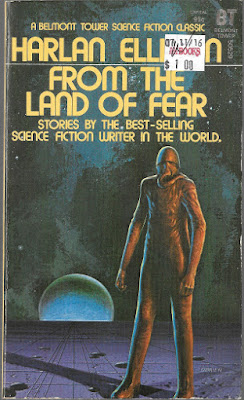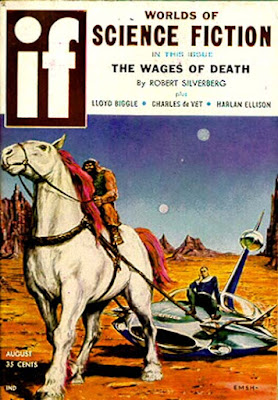Ellison provides an adorable introduction to this collection of ten short stories and one screenplay, which was originally published in 1967. He brags about how brave he is (the only thing he fears is that he will die before he has written all the stories churning inside of him--oh yeah, and contact lenses) and talks about the burden his Talent with a capital T puts on him. For example, when a woman has sex with him, is it because she is attracted to him, or is it "the Talent" that she loves?
The talent that is Me and the Man that is Harlan Ellison are two very separate and distinct entities. That the Man lugs around the Talent becomes at once a blessing and a curse.The last time I read a Belmont Tower book I remarked upon how they had cut corners and left out any page numbers. From the Land of Fear has its own idiosyncrasies; there is no table of contents or page listing where the included stories first appeared. Thank heavens for isfdb! Let's take a look at four Ellison stories which first appeared in SF magazines in the late 1950s.
"We Mourn for Anyone..." (1957)
When this one appeared in Fantastic it was under the title "Mourners for Hire" and under a pseudonym, Ellis Hart. Under his real name Ellison had this issue of Fantastic's cover story, "Satan is My Ally," evidently a tale about a man who rose from the grave. "Satan is My Ally" is a pretty great title, and I love stories about people rising from the grave, so I may take steps to acquire this rarely reprinted piece.
Back to "We Mourn for Anyone..." In his intro to the story Ellison tells us he wants the cheapest possible funeral and for his body to be sold to medical science and the money accrued thereby to be given to The Deacons for Defense and Justice for firearms and to Native American children for clothes. You see, Ellison, citing Jessica Mitford, thinks the funeral home industry is a racket!
Our story takes place in a future of air cars, videophones, and high tech weaponry. Upper-middle-class people are into dueling over slights with hand flamers and other weapons (like in Robert Heinlein's Beyond this Horizon?) People in this society also consider mourning over dead friends and relatives a waste of time and energy, and hire professional mourners to handle this burden while they get on with their careers.
Gordon Vernon murders his cheating wife, Liz (nee Sellman), and then hires the top mourner in the country, Maurice Silvera. Dun dun dun! Unbeknownst to Vernon, Maurice Silvera was the guy who was sleeping with Liz! When Silvera uses his instruments to gauge how sad Vernon is about his wife's falling off the roof of a 96-story skyscraper (to determine how emotive a performance he has to put on) he realizes Vernon is not sad at all! Silvera gives a poor performance, the Sellman family (a bunch of violent nouveau riches) is insulted, and their best duellist challenges Vernon, who has no chance of surviving the encounter. Revenge!
A brisk noirish story full of SF gadgets and strange cultural norms; fun!
"The Sky is Burning" (1958)
In the intro to this one Ellison tells us he has an Alexander Shields bathrobe. I had never heard of this brand before, and am not sure if Ellison is bragging that he is a stylish dresser with an oversized clothing budget or if he is hinting that he is just a man of the people who shops at the 1967 equivalent of Walmart.
This story, which first appeared in If, is narrated by an astronomer. He is among the first to notice that hundreds of meteorites are burning up in the atmosphere of Earth, Venus and Mars. But it turns out these are no ordinary meteorites--they are aliens! People who look like the Egyptian sun god Ra, and have come to our solar system (like creatures from a Lovecraft story, they need no spaceship to cross the cosmos) after living a span of five thousand years to commit suicide!
Before killing himself, one of the thirteen-foot-tall aliens comes to the Earth's surface and telepathically communicates with some scientists, informing them that our solar system is the "end of the Universe" and that the human race will not be permitted to leave it. This bad news breaks the hearts of the more sensitive scientists, including the narrator ("A feeling of waste and futility and hopelessness") and so they commit suicide.
Reminding me of Ellison's intro to the volume, this is an arrogant story about how special people ("Those of us who dreamed"), people who are better than the rest of us, suffer under the terrible burden of their superiority. Ellison includes in the story examples of the hoi polloi for whom he has disdain--a military officer and the narrator's assistant, a careerist--and assures us that they will not be committing suicide because they are so insensitive.
It's bad enough when people who were born with gifts brag about their gifts, but when they turn around and tell you how hard their lives are because they are better than the rest of us, that is hard to take. This story is OK, but it had me rolling my eyes the way I did when attractive women I would meet in New York would moan about how difficult it was being beautiful, what with all the men chasing them and all the other women envying them.
"My Brother Paulie" (1958)
In his intro to this one Ellison tells us it is a "gimmick" story and would have been perfect for The Twilight Zone and admits he made a goof in it. Gimmicks and goofs aside, I really like this story.
Brad Woodland is the sole astronaut on the ninth rocket to try to fly around the moon and take readings of its dark side. The eight previous rockets have all failed in one way or another. But Brad has a still bigger problem--his envious twin brother, Paul, a jerk who has bullied Brad all his life, has stowed away on the rocket and is trying to murder him!
Despite being chased all around the ship by his blaster-wielding brother, Brad completes the mission and gets back to Earth in one piece with the data. It is revealed that the astronauts who helmed the previous eight attempts had gone insane--like in a Kris Neville or Barry Malzberg story, in "My Brother Paulie," space drives you bonkers! The government hypnotized Brad into thinking his brother was along for the ride in order to distract him from whatever it is in space that drives Earthlings mad. But wait, if Paulie and the blaster weren't really on the ship, what are all those blast holes in the cockpit?
I'm not sure I like the second twist of the twist ending (the possibility that Paulie really was aboard) but I like everything else about the story, the suspense scenes and the flashbacks to the boys' contentious youth. Entertaining.
"Back to the Drawing Boards" (1958)
Ellison admits that this one is a little gimmicky and unbelievable, but says that readers will generally go along with the writer, and if readers weren't willing to suspend their disbelief that "Heinlein, Asimov, Vonnegut and myself would be the most imaginative quartet of bricklayers in the world." (Heinlein did some masonry work on his own house and apparently considered it a kind of hobby. I don't know if Asimov or Vonnegut have any history of bricklaying, but Ellison isn't the kind of guy to let logic get in the way of a good story or a good line.)
It is the close of the 21st century! Man has conquered the solar system! TV viewers demand ever more exciting reality programming! To meet this demand an inventor, Leon Packett, toils in his basement, inventing a super strong humanoid robot with a face full of cameras and microphones. He calls the robot Walkaway, and it can go anyplace and get the best film because Packett has programmed it to have human-like emotions.
Packett built Walkaway without any government or institutional support ("I starved for fifteen years") and he hates all government and authority. So he won't sell or give away Walkaway; the military or whoever has to hire Walkaway and pay him wages, just like they would a human employee. When the government hires Walkaway to man (or "staff," as the feminists say) the first ever faster-than-light space ship, bound to explore the galaxy, Packett plots his final revenge on the human race! After Walkaway heads off into hyperspace, Packett commits suicide.
Walkaway returns to Earth three and a half centuries later! The people of Earth lost interest in interstellar travel long ago, and few people even know the name "Leon Packett." The first thing Walkaway does when he lands is not telling everybody about all the awesome stuff he saw out there in space; no, the first thing he does is demand 365 years of wages--plus interest! There isn't that much money in the world, so the people of Earth have to give Walkaway the planet, making him dictator! (The last line of the story hints that the dictator forces everybody to be put in a robot body or something.)
Like the other three stories, "Back to the Drawing Boards," which first appeared in Fantastic Universe, is well-written and paced. Maybe the end could be a little more clear, but I thought it was a pleasant diversion.
**********
 |
| Back cover of my copy of the 1973 edition of From the Land of Fear |
**********
When as a six-year-old child I saw the first Star Wars movie in a New Jersey drive-in theatre I immediately wanted to run out and buy an R2-D2 action figure. Even as an adult living in New York City, after I saw The Phantom Menace I wanted to run over to the Virgin MegaStore on Union Square to buy the film's soundtrack. Apparently, people living in 1973 who had just smoked a pack of Kents ("America's quality cigarette") felt the urge to run right out and buy a Kent-branded ice bucket!
Bound into my copy of Belmont Tower's 1973 paperback edition of From the Land of Fear is a full color ad not only for the Kent cancer sticks themselves, but for Kent-branded popcorn makers, ice buckets, percolators and drinking vessels of all sizes and shapes! [UPDATE 12/8/2016: Check out ukjarry's comment and the accompanying link below for evidence of what Ellison must have thought of this ad!]
 |
| Order these "attractive" "collectables" for your family and friends. |






Save your pennies. That issue of Fantastic is available online at:
ReplyDeletehttps://archive.org/stream/Fantastic_v06n04_1957-05#page/n3/mode/2up
In fact about 90% of all sf and fantasy magazines published before the millennium are available at archive.org except for Asimov’s, F&SF and Analog as they are still active publications.
That edition of Ellison’s book with the cigarette ads resulted in an escalating war over contract stipulations between Ellison and the publisher culminating in Ellison sending them a dead gopher through the post. He tells the story:
https://www.youtube.com/watch?v=MB_hekYXWiw
- matthew davis
In the recording to which you link Ellison refers to New American Library / Signet, so unless he is scrambling up the story for some reason (and somebody in the comments at YouTube does claim Ellison has told a version of the story in which a TV producer, not a publishing exec, is the victim) it doesn't seem like my Belmont edition of From the Land of Fear can have been the trigger for the gopher attack.
DeleteThanks for the link to the reproduction of the issue of Fantastic, but you were too late--my copy of a 1969 magazine containing seven late 1950s Ellison tales is already on its way to my mailbox!
Deletehttp://www.isfdb.org/cgi-bin/pl.cgi?253460